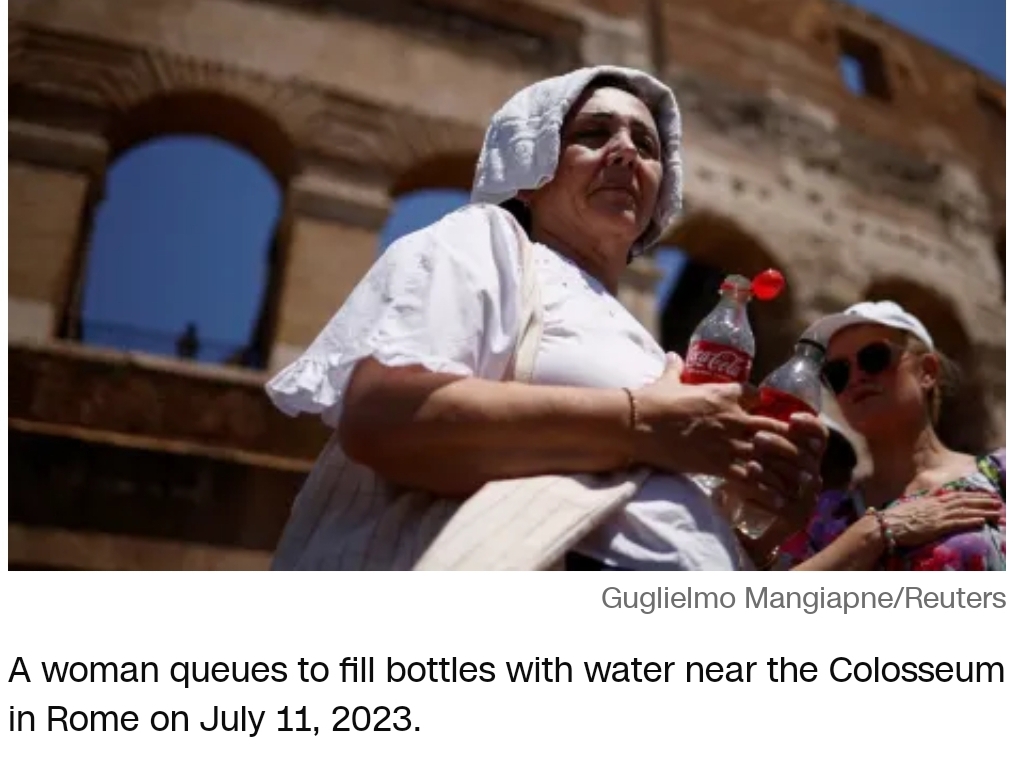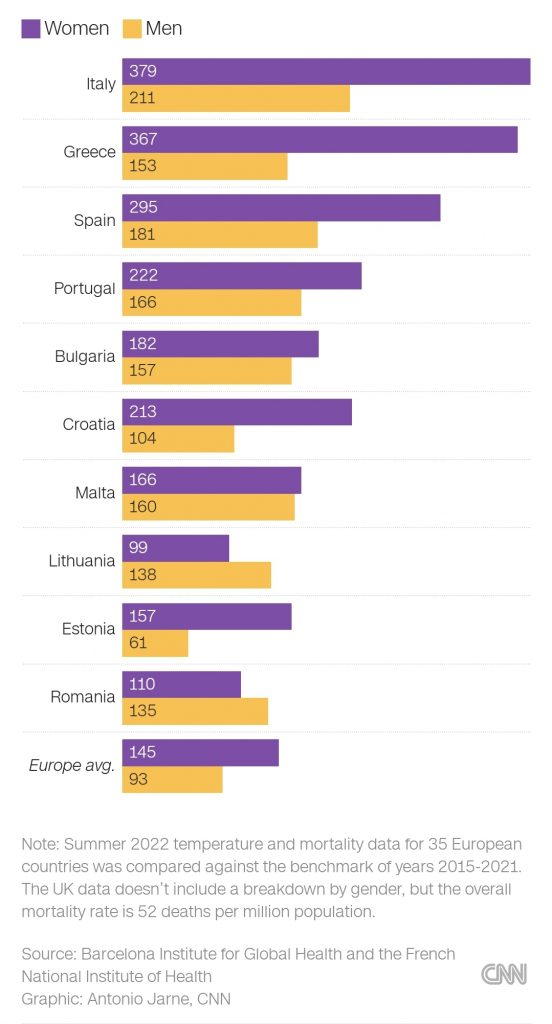
A blistering and deadly heat wave is sweeping Europe, potentially bringing record-breaking temperatures and raising serious concerns about the impacts on people’s health, especially as the continent welcomes an influx of tourists.
Parts of Spain, France, Greece, Croatia and Italy are all facing intense heat, with temperatures rising above 40 degrees Celsius (104 Fahrenheit).
“Temperatures are sizzling across Europe this week amid an intense and prolonged period of heat. And it’s only just begun,” the European Space Agency (ESA) said in a statement.
Heat is one of the deadliest natural hazards – more than 61,000 people died in Europe’s searing summer heat wave last year. The current heat wave – named “Cerberus” by the Italian Meteorological Society after the three-headed monster that features in Dante’s “Inferno” – has prompted further fears for people’s health, especially as it coincides with one of the busiest periods of Europe’s summer tourist season.
In Italy, temperatures could reach record-breaking levels. Sardinia and Sicily are expected to be close to the current European temperature record of 48.8 degrees Celsius (nearly 120 Fahrenheit), according to the ESA.
On Friday, the Italian Health Ministry issued an “extreme” health risk warning for 15 cities – including Rome and Florence – as the heat wave is set to continue over Saturday and Sunday.
It has already claimed at least one life in Italy, where a 44-year-old road construction worker collapsed in the northern city of Lodi and died in hospital on Tuesday.
In Rome, several tourists have collapsed this week due to heat stroke, with one British tourist passing out in front of the ancient Roman Colosseum on Tuesday.
Alessandro Miani, president of the Italian Society of Environmental Medicine (SIMA), told state broadcaster RAI on Wednesday that Italy “has the sad record of the European country with the highest number of deaths caused by heat waves.”
These 10 European countries had the highest heat-related mortality last summer
Europe experienced the hottest summer ever recorded in 2022, which caused nearly 62,000 deaths between May 30 and Sept. 4. In most countries, women died at higher rates than men.
Heat-related deaths per million population

In Greece, authorities have said temperatures could reach 44 degrees Celsius (111.2 Fahrenheit) on Friday or Saturday.
The Greek Culture Ministry said it will shut the Acropolis in Athens from midday local time until 5 p.m. on Friday due to the heat. Police and emergency services provided assistance to a female tourist in difficulty due to the heat at the Acropolis, the police said in a tweet on Friday.
According to the Greek meteorological service forecast, temperatures will peak at 42 Celsius (107.6 Fahrenheit) in Athens by midday.
In Croatia, dozens of firefighters were deployed as a large wildfire broke out near Grebastica, a small town near the coastal city of Sbenik, CNN’s affiliate N1 reported.
Nearly 80 firefighters with 28 fire trucks were deployed on Thursday to put out the blaze, with the assistance of three Canadair firefighting planes and two air tractors, N1 reported.
Footage from the scene shows cars and homes in the town destroyed and, according to N1, the area around Grebastica has been left without electricity. Clouds of smoke could be seen above the villages from nearby tourist beaches, Reuters reported Friday.
Temperatures are expected to stay around 40 degrees Celsius (104 Fahrenheit) across the region into next week.
How to stay cool
Heat is called a “silent killer” because you can’t see it but it can quickly turn deadly. The very young, the elderly and those who have to spend long periods of time outside, such as outdoor workers and people experiencing homelessness, are particularly vulnerable.
The body is used to a range of temperatures between around 36 to 37 degrees Celsius (97 to 99 degrees Fahrenheit). When it rises above this, the body sweats to cool down but the higher the temperature, the harder it is to cool down – especially if it’s humid, which means sweat can’t evaporate as easily.
Heat exhaustion can occur when your body overheats. This can bring dizziness, nausea and headaches. Heat stroke is more serious and happens when your body’s temperature climbs to 40 degrees Celsius (104 Fahrenheit) or higher. Untreated it can damage organs or even cause death.
One of the main recommendations for people to protect themselves from the heat is to stay inside and avoid exercise during the hottest parts of the day, especially between 11 a.m. and 3 p.m. When outside, stay in the shade.
Experts advise that people wear light loose-fitting clothes, a hat and sunscreen and drink plenty of water, even if you don’t feel thirsty, but avoid alcohol and caffeinated drinks.
It’s also important to watch out for others, according to Judith Linden, a professor in the emergency medicine department at Boston University’s school of medicine.
“If somebody starts feeling light-headed, dizzy, nausea or headache, that is the time to act immediately. That means getting them out of the heat and into a cool environment,” she told CNN this week. -CNN News



